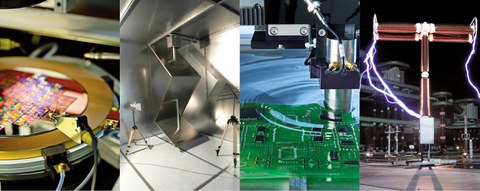Projects and Cooperations
Our faculty's institutes and chairs conduct both basic and applied research. The following overview lists some selected research projects and cooperations in order to prodivde an insight into the variety of reseach topics at the faculty.
Table of contents
Research Clusters
Cluster of Excellence Centre for Tactile Internet with Human-in-the-Loop (CeTI)
Spokesman: Prof. Frank Fitzek
The »Centre for Tactile Internet with Human-in-the-Loop« (CeTI) researches new possibilities of interaction between man and machine. CeTI’s central vision is to enable humans to interact in quasi real-time with cyber-physical systems (CPS) in the real or virtual world over intelligent wide-area communication networks.
Center for Advancing Electronics (cfaed)
Executive board: Prof. Thomas Mikolajick, Prof. Stefan Mannsfeld, Prof. Marc Timme
The cfaed scientists have the common goal to bundle their expertise and creativity in a worldwide unique approach to develop alternative materials, technologies, and systems for the electronics of the future.
Else Kröner-Fresenius Center for Digital Health
Chair of Fundamentals of Electrical Engineering, Chair of RF and Photonics Engineering, Deutsche Telekom Chair of Communication Networks, Chair of Microsystems
The center focuses its research effort on the direct interface of the digital world to the patient thereby serving as a bridge between medical big data efforts and traditional biomedical engineering.
Cluster of Excellence Physics of Life
Spokesman at the Faculty ECE: Prof. Jürgen Czarske
The cluster aims to elucidate the “laws of physics” that underlie the dynamic spatiotemporal organization of life into molecules, cells and tissues. Its unique focus is to bring fundamental physics to biology for the purpose of understanding and solving biological questions. Using this holistic approach PoL is dedicated to identify physical principles that govern the dynamic organization of active living matter across multiple scales utilizing innovative experimental approaches, theoretical predictions and computer simulation.
Chua Memristor Center (CMC)
The Center’s mission is to bundle research on theory and modelling of RRAMs (memristors) with simulation studies and conceptual design of analogue and digital computing architectures and the setup of experimental demonstrators. The Center’s long-term goal is the design and manufacturing of memristor circuits and systems extending or improving the functionalities of state-of-the-art electronic computing systems.
The Competence Center Biomedical Computational Laser Systems (BIOLAS)
Head: Prof. Jürgen Czarske
BIOLAS offers tailored engineering solutions for laser based applications in life sciences.
Center for Explainable and Efficient Artificial Intelligence Technologies (CEE AI)
Deutsche Telekom Professur für Kommunikationsnetze
The goal of the center is to bring together renowned scientists with industry users in order to develop Dresden into a leading location in the field of artificial intelligence.
Labs
Process-To-Order Lab
Coordinator: Prof. Dr. Leon Urbas
The Process-to-Order (P2O) Lab addresses the current challenges of the process industry, which arise through individualization, globalization and urbanization.
Research Laboratory Microelectronics Dresden for Reconfigurable Electronics (ForLab DCST)
Coordinator: Prof. Dr. Thomas Mikolajick
The Institute of Electronic Packaging Technology and the Institute of Semiconductors and Microsystems of the TU Dresden strive together to bridge the gap between the material development and the innovative circuit and systems design.
5G Lab Germany
Coordinators: Prof. Dr. Gerhard Fettweis, Prof. Dr. Frank Fitzek
With more than 20 faculty members, more than almost 600 researchers and industry cooperation partners the 5G Lab tackles the upcoming research challenges in the 5G world.
DFG-Priority Programmes
SPP 2262 Memristive Devices Toward Smart Technical Systems (MemrisTec)
Coordinator: Prof. Dr. Ronald Tetzlaff
The MemrisTec's goal is to research scientific basics for memristors in order to enable industrial applications.
Selected Research Projects
Human Brain Project
Chair of Highly-Parallel VLSI Systems and Neuro-Microelectronics
250 researchers from 23 countries work together to simulate the human brain.
6G-life
TU Dresden and the TU München have joined forces to form the 6G-life research hub to drive cutting-edge research for future 6G communication networks with a focus on human-machine collaboration.
National 5G Energy Hub
Participants: Prof. Peter Schegner, Prof. Frank Fitzek
Researchers from the fields of machine engineering, electrical engineering and communication technology strive together to make the 5G-mobile communication standard usable for applications in the energy technology.
H2Giga/HyLeiT
Participants: Prof. Steffen Bernet, Prof. Peter Schegner, Dr. Stephan Schlegel
The HyLeiT project is a joint project within the hydrogen lead project H2Giga of the Federal Government and thus part of the National Hydrogen Strategy. The aim is to develop a new generation of electrolysis converters and electrical system technology for the energy supply of hydrogen electrolysis for the production of green hydrogen on an industrial scale.
Graduiertenkollegs
Förderliche Gestaltung cyber-physischer Produktionssysteme (GRK 2323)
Sprecher: Prof. Dr.-Ing. Leon Urbas
Das GRK beschäftigt sich mit der Gestaltung der Kooperation von Mensch und Maschine in cyber-physischen Produktionssystemen (CPPS).
Hydrogel-basierte Mikrosysteme (GRK 1865)
Sprecher: Prof. Dr.-Ing. Gerald Gerlach
Ingenieure, Physiker, Materialwissenschaftler und Chemiker arbeiten im Rahmen des Kollegs an mikrosystemtechnischen, struktur- und strömungsmechanischen Anwendungen sowie grundlegenden Eigenschaften des vielseitigen Materials "Hydrogel".
Research Training Groups
Conducive Design of Cyber-physical Production SystemS (RTG 2323)
Spokesman: Prof. Dr.-Ing. Leon Urbas
The RTG focuses on the Conducive Design of the cooperation between human operators and technology in cyber-physical production systems (CPPS).
Hydrogel-based Microsystems (RTG 1865)
Spokesman: Prof. Dr.-Ing. Gerald Gerlach
Engineers, physicists, material scientists and chemists work on microsystems, structural and fluid mechanics applications as well as fundamental properties of the versatile material "hydrogel".
Junior Research Groups
Heisenberg-Group 3D Mesoscopic Systems
Head: Dr.-Ing. Robert Kirchner
Researchers strive to advance micro- and nanofabrication technology, provide innovative solutions for future mesoscopic (micro+nano) systems, and generate expert knowledge.
Emmy-Noether-Group MEITNER
Head: Dr. Ernst-Friedrich Markus Henke
Researchers work on flexible materials, manufacturing processes, and complex bionic robot systems to allow flexible and adaptiv robot systems.

